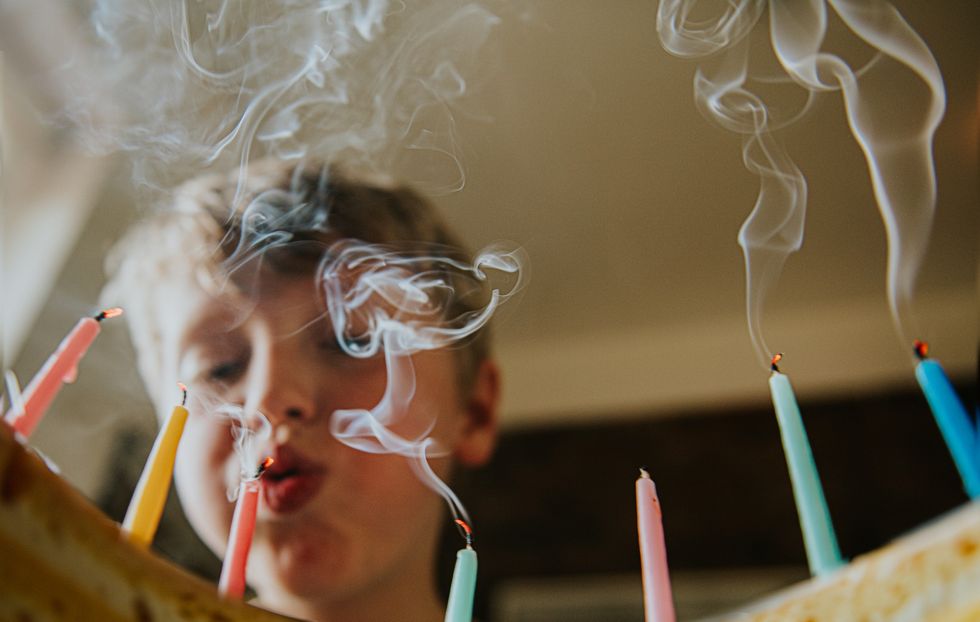George Bunn
Guest Reporter
Burning birthday candles could impair people's cognitive abilities, according to new research from scientists at the Universities of Birmingham and Manchester.
The study found that individuals exposed to candle smoke in an unventilated room showed reduced ability to focus and recognise emotions in others.
Researchers are now advising people to keep windows open when celebrating birthdays with cake and candles.
Scientists conducted tests on 26 participants who spent an hour in a candlelit room, with cognitive assessments performed four hours after exposure.

The research, published in Nature Communications, compared participants' performance after being exposed to either high levels of particulate matter from candle smoke or clean air.
The tests measured various brain functions including working memory, selective attention, emotion recognition and sustained attention. Results showed significant declines in selective attention and emotion recognition among participants exposed to candle smoke.
Dr Thomas Faherty of the University of Birmingham said "Participants exposed to air pollution were not as good at avoiding the distracting information.
"Supermarket shopping is a good example... it might mean that you get more distracted by impulse buys when you're walking along supermarket aisles because you're not able to focus on your task goals."
LATEST DEVELOPMENTS:

Scientists believe the cognitive effects are caused by inflammation in the brain triggered by air pollution from the burning candle.
However, the study found that not all brain functions were equally affected, with working memory and reaction times showing no significant changes after exposure. The impairments occurred regardless of whether participants breathed through their mouths or noses.
"What I want people to take from it is to be wary of what you're doing in the home that could be affecting your wellbeing," Dr Faherty told The Times.
"Blowing candles out on a birthday cake is something we do quite often, but just make sure you're ventilating the space," he added.
The researcher also advised applying the same precautions when cooking, noting that "reducing your personal exposure to air pollution is easier than you think."
Air pollution, particularly PM2.5 particles smaller than 2.5 micrometres, has been linked to serious health conditions including dementia, cardiovascular disease and asthma.
According to the World Health Organization, outdoor air pollution causes approximately 4.2 million premature deaths globally each year.
The WHO recommends that 24-hour PM2.5 exposure should not exceed 15 micrograms per cubic metre, with an annual limit of 5 micrograms per cubic metre.
Find Out More...
The study found that individuals exposed to candle smoke in an unventilated room showed reduced ability to focus and recognise emotions in others.
Researchers are now advising people to keep windows open when celebrating birthdays with cake and candles.
Scientists conducted tests on 26 participants who spent an hour in a candlelit room, with cognitive assessments performed four hours after exposure.

The research, published in Nature Communications, compared participants' performance after being exposed to either high levels of particulate matter from candle smoke or clean air.
The tests measured various brain functions including working memory, selective attention, emotion recognition and sustained attention. Results showed significant declines in selective attention and emotion recognition among participants exposed to candle smoke.
Dr Thomas Faherty of the University of Birmingham said "Participants exposed to air pollution were not as good at avoiding the distracting information.
"Supermarket shopping is a good example... it might mean that you get more distracted by impulse buys when you're walking along supermarket aisles because you're not able to focus on your task goals."
LATEST DEVELOPMENTS:
- ‘We’re not going anywhere!’ Ex-rugby star who was diagnosed with dementia aged 40 lays down gauntlet ahead of head injury lawsuit
- Campaigner who suffered alarming Covid vaccine side-effects demands compensation scheme revamp
- Volleyball player breaks silence after suffering serious brain injury from transgender opponent

Scientists believe the cognitive effects are caused by inflammation in the brain triggered by air pollution from the burning candle.
However, the study found that not all brain functions were equally affected, with working memory and reaction times showing no significant changes after exposure. The impairments occurred regardless of whether participants breathed through their mouths or noses.
"What I want people to take from it is to be wary of what you're doing in the home that could be affecting your wellbeing," Dr Faherty told The Times.
"Blowing candles out on a birthday cake is something we do quite often, but just make sure you're ventilating the space," he added.
The researcher also advised applying the same precautions when cooking, noting that "reducing your personal exposure to air pollution is easier than you think."
Air pollution, particularly PM2.5 particles smaller than 2.5 micrometres, has been linked to serious health conditions including dementia, cardiovascular disease and asthma.
According to the World Health Organization, outdoor air pollution causes approximately 4.2 million premature deaths globally each year.
The WHO recommends that 24-hour PM2.5 exposure should not exceed 15 micrograms per cubic metre, with an annual limit of 5 micrograms per cubic metre.
Find Out More...
